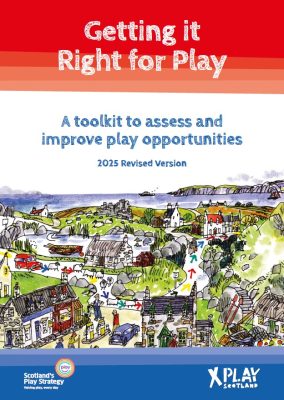
The purpose of a Play Sufficiency Assessment (PSA) is to assess the quantity, quality and accessibility of play spaces for all children. These values can be measured in a range of ways. In conducting PSAs and giving advice to different local authorities, Play Scotland has been able to investigate the most effective ways of gathering information, and through reflective practice considered what was the most useful information to gather.
Play Scotland carried out the first PSAs in Scotland, for East Ayrshire Council and for East Lothian Council. By working with these and other local authorities and groups, Play Scotland developed a revised range of tools and indicators which have been used to update the Getting it Right for Play Toolkit.
There is some key information that a PSA must include:
· Information on formal play spaces, (sometimes called equipped play spaces or play parks) recognising the importance of these to children and families
· Information on informal play spaces which have been identified as “relevant”
· Statements setting out the assessment of the sufficiency of play opportunities with regard to quality, quantity and accessibility by locality and in the totality of the planning authority area
Why quantity, quality and accessibility?
Play Scotland has carried out many engagements over the years with children and young people and they have provided consistent messages. Children want places to play that are near to their homes and are clean and well maintained. Play Scotland’s State of Play Report confirms that “Children and young people want spaces that are close to home, interesting and varied and include nature. They want to feel that they are safe and welcome in those spaces and that the space is valued and maintained.”
“The parks are all broken and need fixed. It makes me sad.” 10-year-old, female, Stonehaven, Aberdeenshire
“It is small and not for teenagers.” 14-year-old, White British, female, Melrose, Scottish Borders
“no, all too far a walk away and not much to play with for our ages. All too small or babyish.” 13-year-old, White Scottish, female, Glenrothes, Fife[4]
In addition to that children want parks to be accessible and inclusive, asking for “safer and more accessible places for play. Children wanted inclusive places for playing with their friends and siblings of all abilities.”. Discussions specifically with disabled children and their families told shocking stories of lack of provision,
“No, I use a wheelchair full time and there isn’t many places I can join in locally.” 9-year-old, White Scottish, female, Motherwell, North Lanarkshire
“There is nothing to. I am autistic and need places I can feel safe and secure” 14-year-old, White Scottish, female, Torphichen, West Lothian[6]
Accordingly, when undertaking PSA’s Play Scotland decided to use an assessment that would specifically cover accessibility and inclusion.




